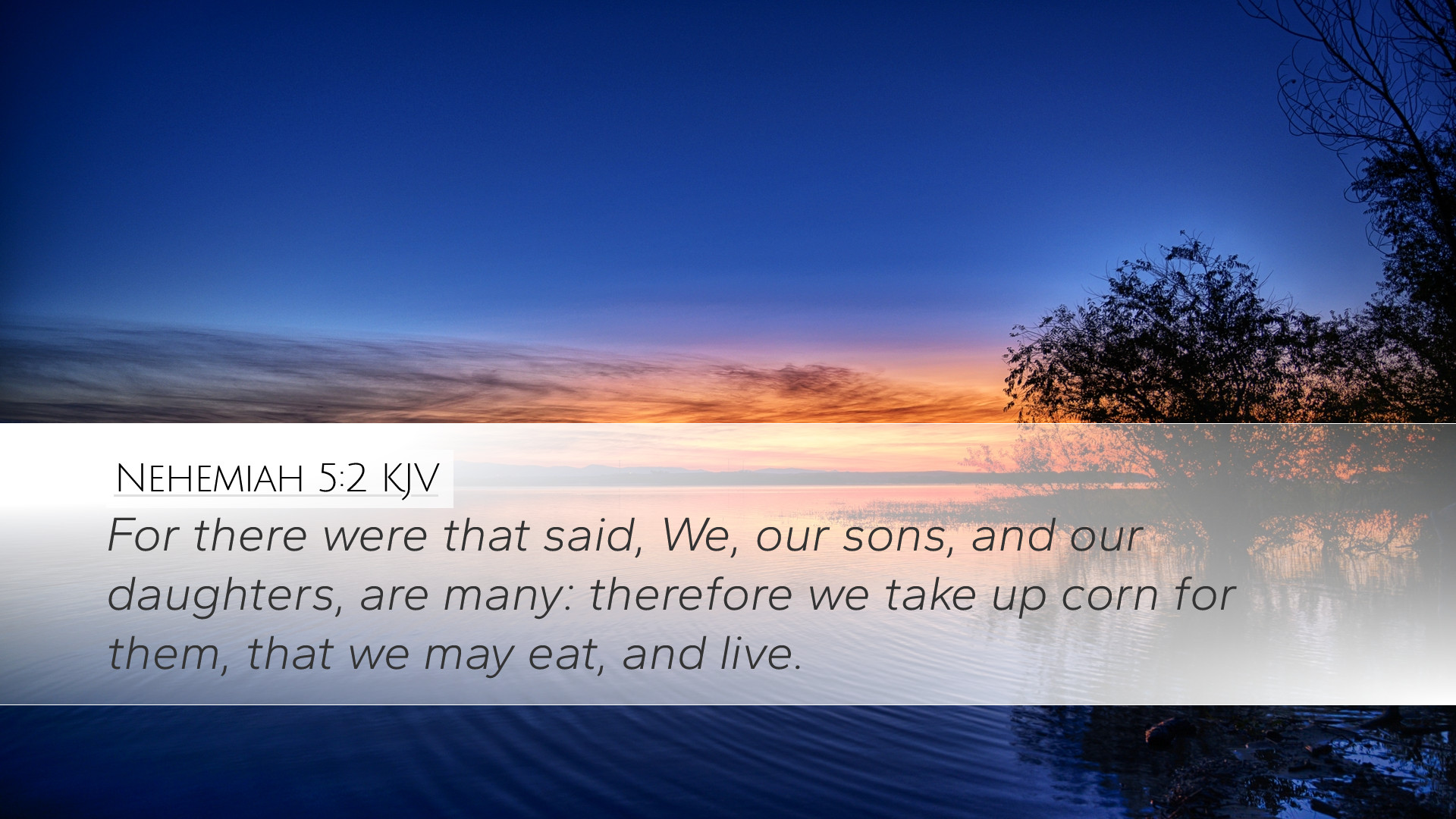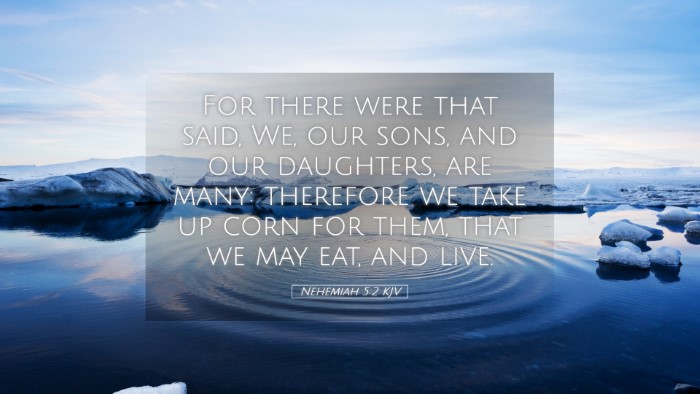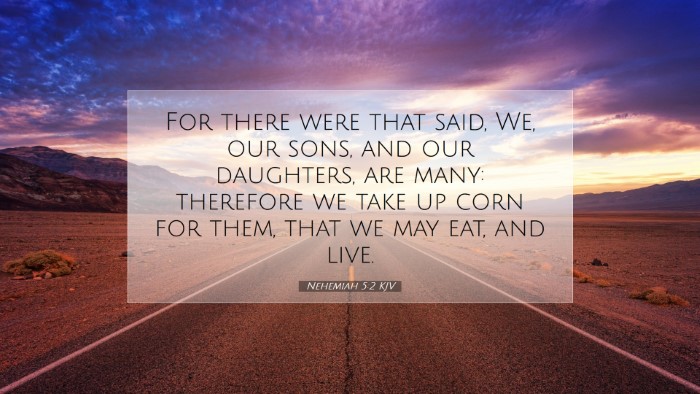Old Testament
Genesis Exodus Leviticus Numbers Deuteronomy Joshua Judges Ruth 1 Samuel 2 Samuel 1 Kings 2 Kings 1 Chronicles 2 Chronicles Ezra Nehemiah Esther Job Psalms Proverbs Ecclesiastes Song of Solomon Isaiah Jeremiah Lamentations Ezekiel Daniel Hosea Joel Amos Obadiah Jonah Micah Nahum Habakkuk Zephaniah Haggai Zechariah MalachiNehemiah 5:2
Nehemiah 5:2 KJV
For there were that said, We, our sons, and our daughters, are many: therefore we take up corn for them, that we may eat, and live.
Nehemiah 5:2 Bible Commentary
Commentary on Nehemiah 5:2
Nehemiah 5:2 (KJV): "For there were that said, We, our sons and our daughters, are many: therefore we take up corn for them, that we may eat, and live."
Introduction
The book of Nehemiah provides a compelling narrative of the restoration of the walls of Jerusalem and the social reforms enacted by Nehemiah during his governorship. Nehemiah 5:2 brings to light a critical issue of economic hardship faced by the people, specifically the struggle for sustenance amidst the rebuilding efforts. This commentary synthesizes insights from notable public domain commentaries, providing a comprehensive understanding of the verse for pastors, students, theologians, and scholars.
Context and Background
Nehemiah returned to Jerusalem to oversee the reconstruction of the city's walls after the Babylonian exile. His leadership faced numerous challenges, including opposition from enemies and internal strife. The people’s cry for help in Nehemiah 5:2 is indicative of socioeconomic tensions, emphasizing the duality of physical and spiritual restoration. Below, we explore this verse's implications through various commentators' lenses.
Exposition of Nehemiah 5:2
Matthew Henry's Commentary
Matthew Henry highlights the urgent plea of the people, illustrating their desperation. He notes that the multitude of families necessitated greater access to food, hinting at the demographic pressures faced during this rebuilding phase.
- Economic Disparity: Henry points out that the wealthy were often exploiting the poor, exacerbating their difficulties. This exploitation becomes critical as Nehemiah subsequently addresses these injustices.
- Family Responsibility: The phrase "we, our sons and our daughters, are many" suggests a burden of responsibility on parents to provide for their families. This not only serves economic purposes but also reflects the community's commitment to familial duties.
Albert Barnes' Notes on the Bible
Albert Barnes provides a detailed look at the social dynamics present in Jerusalem at this time. He emphasizes the contrast between the rebuilding efforts and the grinding poverty experienced by many.
- Poverty Stricken Condition: Barnes notes the physical toll that such poverty takes on families, leading to a culture of desperation. The demand for corn to sustain families indicates a widespread hunger that is systemic rather than individual.
- Collective Voice: This verse exemplifies the collective nature of their cry, which underscores a significant point of unity among the Jewish people in their adversity—something crucial in the face of external opposition.
Adam Clarke's Commentary
Adam Clarke adds another layer to the understanding of this verse by discussing the implications of their plea. He focuses on the mention of "corn" and its significance in the agrarian society of ancient Israel.
- Agricultural Dependence: Clarke notes that corn was a staple, and its scarcity indicated potential famine or economic imbalance, critical issues that demanded immediate attention from Nehemiah.
- Call to Action:** Clarke emphasizes that Nehemiah’s response to this plea is pivotal in his leadership role, providing a moral and ethical framework in which a governor is to act in the interest of his people.
Theological Implications
This verse serves as a powerful reminder of the socio-economic responsibilities of leaders, echoing throughout Scripture the call for justice and compassion towards the marginalized. As Nehemiah hears the cry of his people, it serves as a reflection of God's heart for the needy and oppressed.
- Creation and Community: The collective reality of hunger challenges the individualistic mindset; the emphasis on "we" reminds us that God's people are intricately linked.
- Justice and Leadership: Nehemiah's leadership can be viewed as a template for modern-day governance, where moral stewardship is paramount to social integrity.
Application for Today
Nehemiah 5:2 calls for significant reflection on contemporary issues of social justice, economic disparity, and communal responsibility. For pastors and church leaders, this verse challenges them to recognize the socio-economic conditions within their congregations and urge the church to act.
- Community Needs: Churches should adopt proactive measures to address not only spiritual needs but also practical necessities, fostering a well-rounded ministry that reflects Christ’s love.
- Advocacy: The act of advocacy for the poor and vulnerable should be a central tenant of Christian witness, imitating Nehemiah’s response to the grievances of his people.
Conclusion
Nehemiah 5:2 opens a window into the complexities of community life faced during the time of rebuilding Jerusalem’s walls. The insights from Matthew Henry, Albert Barnes, and Adam Clarke provide depth to our understanding of the verse and its theological implications. As we reflect on this scripture, we are reminded of our collective responsibility and the call we have—both as leaders and as members of the body of Christ—to respond to the needs of those around us.


